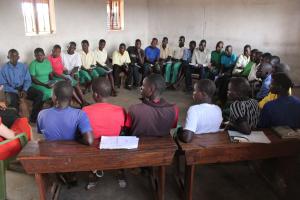Crossing the Borders to Peace

“There are no boundaries to peace,” says Theo Koffler founder of a registered charitable organization, called Mindfulness Without Borders.
“Peace begins between four eyes. It takes two people to listen and understand one another in order to dissolve the divide implicit in the ‘us’ and ‘them’ paradigm.”
This is the core founding philosophy of Koffler’s work and vision.
Influenced by her personal journey toward health and by the teachings of spiritual leaders such as Thich Nhat Hanh and Deepak Chopra, Koffler is truly passionate about cultivating mindful living on the planet. She believes that every individual has the unique talents and gifts to be powerful agents for change. And with the right conditions and skill sets, can have a positive impact on the communities and environments that surround them.
Beginning in the 1990’s, Koffler’s work involved researching the role of mindfulness in war torn countries and conflict zones. This took her to places such as Israel, Palestinian Territories, Rwanda, Nigeria and Uganda. Overwhelmed by the trauma deeply present in those countries, she set forth to investigate how social, emotional and mental training could help restore a sense of well-being in populations that have an appetite to reshape themselves.
During that period, Koffler noticed that the internal narratives that govern individuals play a significant role in their emotional and physical health. Fortunately, one’s past narrative need not overshadow the possibility for change, as neuroscientific research shows that brains are malleable. Given the right guidance and practices related to present moment awareness (mindfulness), stories of violence, destruction and victimhood so entrenched in many societies, can transform over time to narratives that place an individual as an empowered being in their life, not defined by their history, rather as conscious co-creators of their desired reality. Through this shifting of consciousness, Koffler saw how a culture of mindfulness could re-orient the lives of those affected by conflict and challenge.
“We all have stresses in our life; however, it’s the causes and conditions that change as you cross borders,” explains Koffler. “No matter what the history, drama or conflict, we can learn universal skills to help mediate those stresses.” From this experience, Koffler decided to create a program on mindfulness that would travel the world teaching those universal tools. From her perspective, education has been too heavily focused on cognitive development and is in great need of a more holistic approach, including all aspects of student well being.
 In 2007, Mindfulness Without Borders (MWB) was born with a mission “to cultivate learning environments where people of all cultures can develop an intelligence of the heart.” Now in it’s eighth year, MWB has facilitated programs in eight countries across the world and in many diverse contexts.
In 2007, Mindfulness Without Borders (MWB) was born with a mission “to cultivate learning environments where people of all cultures can develop an intelligence of the heart.” Now in it’s eighth year, MWB has facilitated programs in eight countries across the world and in many diverse contexts.
MWB’s program is based on creating mindfulness ambassador councils (MAC) for adolescents that run through a 12-module curriculum with exercises reinforcing social and emotional competencies and secular mindfulness practices. As part of the program, educators and health care professionals are trained to be facilitators, shifting their role from one of authoritarian figure to equal partner and guide. A typical session includes a theme-based lesson, interactive dialogue, mindfulness practices and a take home activity. The guidelines of deep listening, open-mindedness and appreciation for diversity are reinforced to create a stronger sense of community belonging within the council.
“Our mandate is to develop mindfulness ambassadors, whereby participants of our program can integrate what resonates for them into their daily lives. We provide a safe place for individuals to express themselves in order to bolster self esteem, self reflection and compassion,” says Koffler. “Overtime participants begin to see themselves in each other and take ownership of our shared humanity in turn, to experience peace from the inside out.”
Students who participate in this program have undergone tremendous transformation, explains Koffler. “They become ambassadors of compassion and kindness. Recent research demonstrates that the program reduces stress and anxiety as participants learn to use secular breathing practices to calm their minds and hearts.”
Participants have expressed that after attending a council it feels like a weight has lifted. They felt heard, valued and they become more aware of how their thoughts and actions impact others. At the conclusion of the program, participants graduate with the attitude to become messengers of mindful living within their families, schools and communities, hence, mindfulness ambassadors.
Over the next few years, Mindfulness Without Borders plans to expand its programs to adults and professionals through Online Learning and Continuing Education in Universities.
For more information on their programs, visit their website here.







Comments
Post new comment